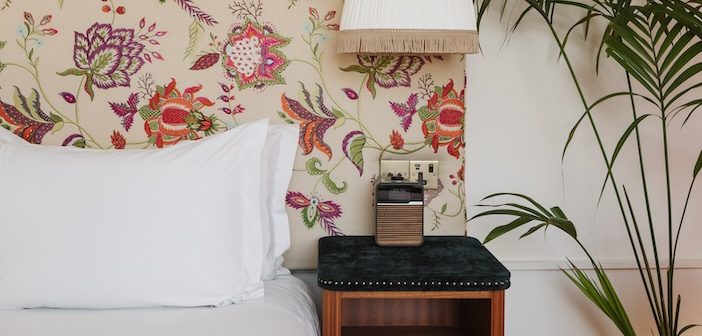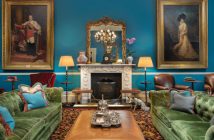On the south side of Dublin, where Georgian houses still stand in obedient rows like a regiment on parade, The Leinster has risen like a phoenix from the ashes of ‘Howl at the Moon’, once the city’s shrine to beer which cost more in dignity than in coin. Online reviewers embalmed it as ‘a chill place’ where cocktails came ‘two for €10’; one, less charitable, recalled it as nothing more than ‘commercial music and ugly people’ – proof that to howl at the moon is to squander time and energy on something both futile and faintly sticky.
Yet only months before The Leinster’s polished arrival, the same stretch of Lower Mount Street had become famous for darker reasons. From winter into spring, a makeshift encampment of asylum seekers lined the pavement outside the International Protection Office. By May Day 2024, nearly 300 men were bussed to tented sites at Citywest and Crooksling, their tarpaulins dismantled, pavements hosed down, and the city’s reputation as ‘the land of a thousand welcomes’ suddenly rewritten in headlines as something more conditional.
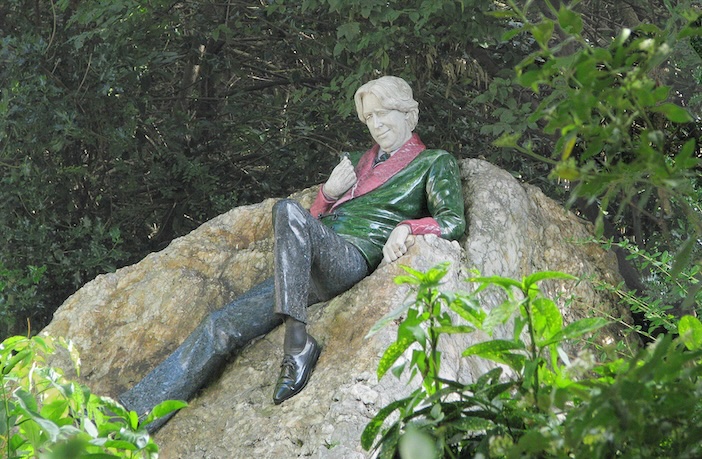
Oscar Wilde by Danny Osborne (photo: Creative Commons)
Across Merrion Square, the city tells different stories in stone, bronze and wood. Danny Osborne’s Oscar Wilde sprawls across a Wicklow boulder in nephrite jade and pink thulite, flanked by pillars etched with his words in the hands of Seamus Heaney, John B. Keane and Michael D. Higgins. One side smiles, the other collapses into melancholy – boulevardier and broken man, depending on your angle of approach.
Not far off, The Joker’s Chair commemorates satirist, Dermot Morgan, better known as Father Ted: a simple wooden seat with a plaque inscribed from Shakespeare’s fool in King Lear: ‘and all the rest is laughter laughter liberating laughter to be remembered.’ Where Wilde is rendered in costly stones and heroic scale, Morgan is remembered through a bench you can actually sit on. Between Wilde undone by punishment and Morgan memorialised far too soon, the square is kept in balance: wit and tragedy, satire and sorrow.
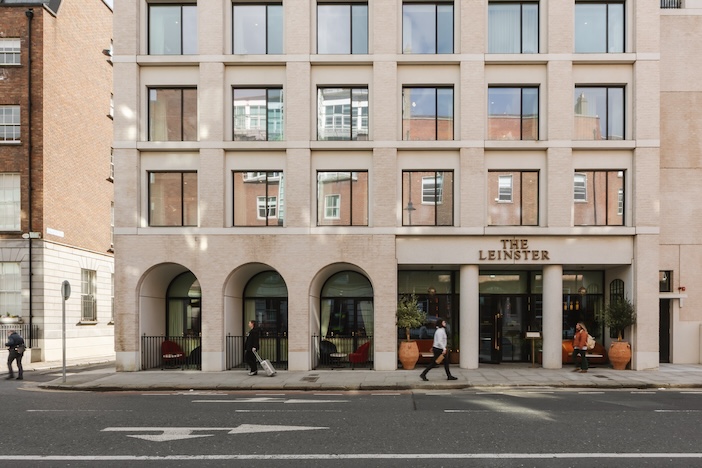
Into this charged geography comes The Leinster. A townhouse reimagined by Dean Group with ODOS Architects and Henchion Reuter, its interiors directed by Marie Smyckova of O’Donnell O’Neill. She speaks of ‘classical contemporary’ – Georgian symmetry dressed with veined marble, bold geometrics, velvets and mohair. In truth it is more mischievous than that: cultivated, urbane, and resistant to any single decade.
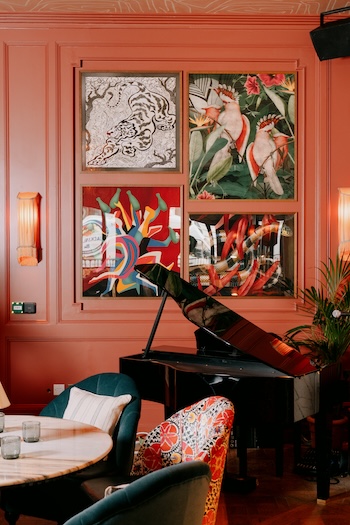 The arches behind the Collins Club bar rise like a tube façade by Leslie Green; the rooftop gleams with its pink marble counter and tactile chairs; bedrooms revel in floral headboards, velvet cabinetry and patterned carpets which dare you to walk them barefoot. Even the loos hum with Japanese washlets, as if spacecraft had discreetly docked in the stalls.
The arches behind the Collins Club bar rise like a tube façade by Leslie Green; the rooftop gleams with its pink marble counter and tactile chairs; bedrooms revel in floral headboards, velvet cabinetry and patterned carpets which dare you to walk them barefoot. Even the loos hum with Japanese washlets, as if spacecraft had discreetly docked in the stalls.
More than 300 works of art leer and mutter from the walls, including a Damien Hirst butterfly circle which dominates reception. Stand in front of it, and the staff themselves become part of the composition, haloed in iridescent wings as they hand over keys – a visual accident too perfect to stage. On my visit, the vestibules doubled as catwalks for Irish Fashion Week auditions, an accidental mise-en-scène entirely in keeping with the house style.
Outside, meanwhile, the city was thrumming with its own carnival: thousands of Americans had descended for Ireland’s first-ever NFL regular season game at Croke Park, Pittsburgh Steelers versus Minnesota Vikings, Dublin Castle pressed into service as the ‘NFL Experience Dublin’. Shoulder pads, shamrocks and selfies mingled with the Georgian order.
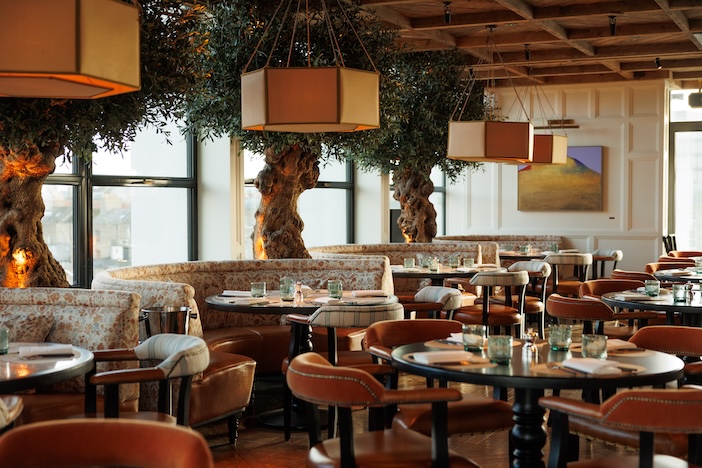
The rooftop restaurant bears Jean-Georges Vongerichten’s banner, though it is Dublin-born, Ben Dineen who realises the food. His procession begins decadently with eggs-on-egg – butter-brioche clasping a slow-cooked yolk capped with caviar – before spiralling through treasures of the sea: tuna tartare bright with ginger, organic salmon crouched on crisped rice, Lambay crab rolled into spring rolls the size of cigars. Squid and octopus arrive charred and supple, bolstered by cashew romesco, while mains move from pan-roast cod in a clam and guanciale broth to grass-fed John Stone beef with Parmesan and chilli.
Desserts keep the sauciness alive: the infamous chocolate fondant (claimed to have been created by both Michel Bras and Jean-Georges) and a champagne-sabayon peach with a measure of Château d’Yquem. All of it moves to a disco-era soundtrack – Fat Larry’s Band pulsing through the mirrored room, a Manhattan nod from Vongerichten back to himself.
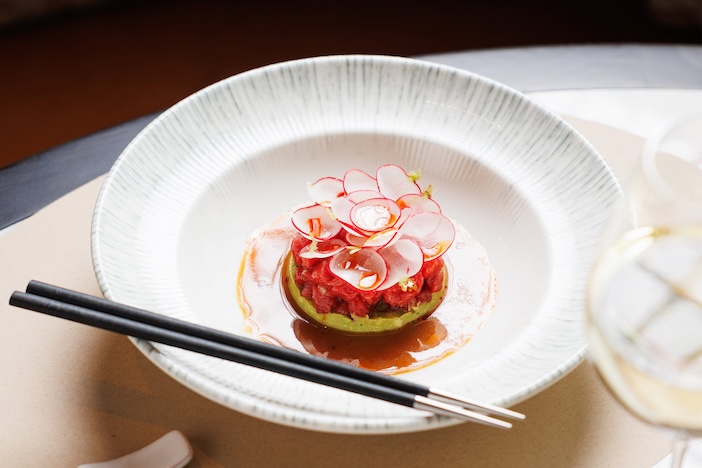
Wine is the realm of Brazilian-born, Deivid Pacheco, who might have played it safe, but instead composes a polyphonic list ranging from Armenia’s Areni Noir to Slovenia’s Rebula and China’s Pretty Pony. His enthusiasm is infectious: less gatekeeper than guide, armed with a Coravin contraption, he makes discovery feel like immoderation rather than instruction.
Below, The Collins Club unfurls in darker tones. Named for the late, Dublin-born, Vogue-acclaimed designer, David Collins, it cloaks glamour in velvet drapes, its neon and mirrors catching you unawares. Luka Breskovac presides with charm, pouring powerful, miniature cocktail flights, experimenting with chocolate and tequila from a lab of dripping coils gleaming under the lights, and serving a bird’s-eye-chilli margarita hot enough to wake the dead poets in Merrion Square. Once a month, Champagne Cha Cha takes over, a brunch-cum-cabaret which proves Dublin still knows how to misbehave.
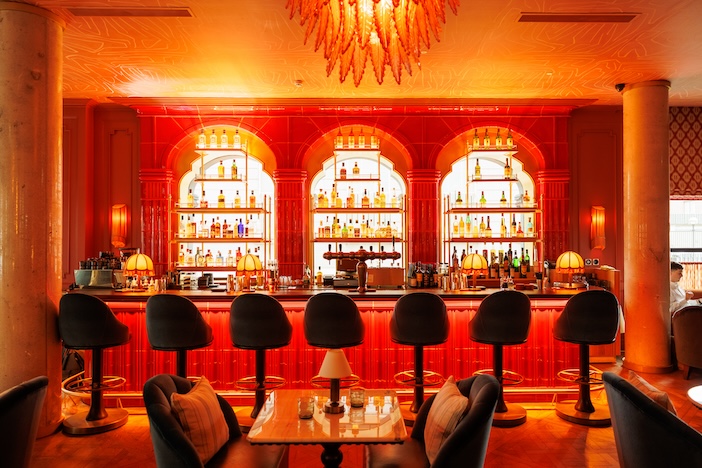
The Leinster is not just another boutique graft onto the city’s roster. It balances history with novelty, sobriety with sin, high art with low play. Wilde is carved in jade, Morgan in wood, and the College of Anaesthesiologists waits down the street, a reminder that in Dublin even ecstasy comes with its antidote.
But the prevailing note is not irony. For all its art and architecture, its satirical neighbours and political shadows, The Leinster is a house of joy and hospitality. It offers Dubliners and visitors alike a stage on which wit, comfort and conviviality can be played out without futility. To howl at the moon may once have been to waste your time – here, in a weekend when Wilde grinned, Morgan laughed, and Americans tailgated in Merrion Square, it felt like time very well spent.
The Leinster, 7 Mount Street Lower, Dublin. For more information, including details of offers and events, please visit www.theleinster.ie.

